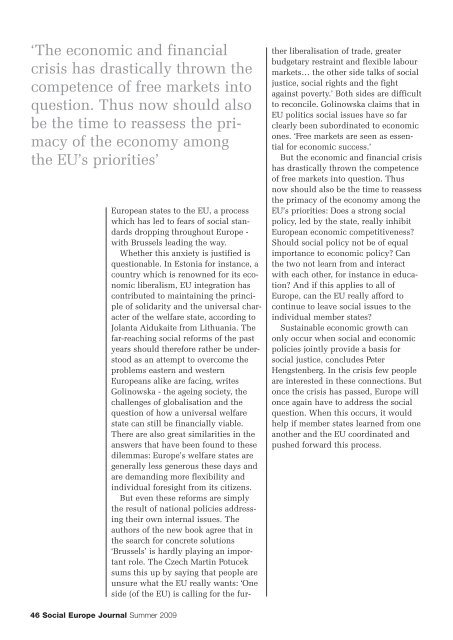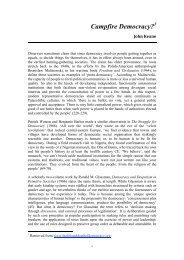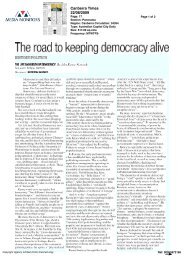The Ethics of Capitalism - Social Europe Journal
The Ethics of Capitalism - Social Europe Journal
The Ethics of Capitalism - Social Europe Journal
You also want an ePaper? Increase the reach of your titles
YUMPU automatically turns print PDFs into web optimized ePapers that Google loves.
‘<strong>The</strong> economic and financial<br />
crisis has drastically thrown the<br />
competence <strong>of</strong> free markets into<br />
question. Thus now should also<br />
be the time to reassess the primacy<br />
<strong>of</strong> the economy among<br />
the EU’s priorities’<br />
<strong>Europe</strong>an states to the EU, a process<br />
which has led to fears <strong>of</strong> social standards<br />
dropping throughout <strong>Europe</strong> -<br />
with Brussels leading the way.<br />
Whether this anxiety is justified is<br />
questionable. In Estonia for instance, a<br />
country which is renowned for its economic<br />
liberalism, EU integration has<br />
contributed to maintaining the principle<br />
<strong>of</strong> solidarity and the universal character<br />
<strong>of</strong> the welfare state, according to<br />
Jolanta Aidukaite from Lithuania. <strong>The</strong><br />
far-reaching social reforms <strong>of</strong> the past<br />
years should therefore rather be understood<br />
as an attempt to overcome the<br />
problems eastern and western<br />
<strong>Europe</strong>ans alike are facing, writes<br />
Golinowska - the ageing society, the<br />
challenges <strong>of</strong> globalisation and the<br />
question <strong>of</strong> how a universal welfare<br />
state can still be financially viable.<br />
<strong>The</strong>re are also great similarities in the<br />
answers that have been found to these<br />
dilemmas: <strong>Europe</strong>’s welfare states are<br />
generally less generous these days and<br />
are demanding more flexibility and<br />
individual foresight from its citizens.<br />
But even these reforms are simply<br />
the result <strong>of</strong> national policies addressing<br />
their own internal issues. <strong>The</strong><br />
authors <strong>of</strong> the new book agree that in<br />
the search for concrete solutions<br />
‘Brussels’ is hardly playing an important<br />
role. <strong>The</strong> Czech Martin Potucek<br />
sums this up by saying that people are<br />
unsure what the EU really wants: ‘One<br />
side (<strong>of</strong> the EU) is calling for the further<br />
liberalisation <strong>of</strong> trade, greater<br />
budgetary restraint and flexible labour<br />
markets… the other side talks <strong>of</strong> social<br />
justice, social rights and the fight<br />
against poverty.’ Both sides are difficult<br />
to reconcile. Golinowska claims that in<br />
EU politics social issues have so far<br />
clearly been subordinated to economic<br />
ones. ‘Free markets are seen as essential<br />
for economic success.’<br />
But the economic and financial crisis<br />
has drastically thrown the competence<br />
<strong>of</strong> free markets into question. Thus<br />
now should also be the time to reassess<br />
the primacy <strong>of</strong> the economy among the<br />
EU’s priorities: Does a strong social<br />
policy, led by the state, really inhibit<br />
<strong>Europe</strong>an economic competitiveness<br />
Should social policy not be <strong>of</strong> equal<br />
importance to economic policy Can<br />
the two not learn from and interact<br />
with each other, for instance in education<br />
And if this applies to all <strong>of</strong><br />
<strong>Europe</strong>, can the EU really afford to<br />
continue to leave social issues to the<br />
individual member states<br />
Sustainable economic growth can<br />
only occur when social and economic<br />
policies jointly provide a basis for<br />
social justice, concludes Peter<br />
Hengstenberg. In the crisis few people<br />
are interested in these connections. But<br />
once the crisis has passed, <strong>Europe</strong> will<br />
once again have to address the social<br />
question. When this occurs, it would<br />
help if member states learned from one<br />
another and the EU coordinated and<br />
pushed forward this process.<br />
46 <strong>Social</strong> <strong>Europe</strong> <strong>Journal</strong> Summer 2009







